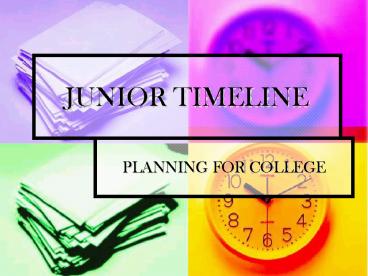JUNIOR TIMELINE - PowerPoint PPT Presentation
1 / 16
Title:
JUNIOR TIMELINE
Description:
Focus on the activities that are truly enhancing your life and drop those ... do not need to decide at this time but you should have some strong contenders. ... – PowerPoint PPT presentation
Number of Views:19
Avg rating:3.0/5.0
Title: JUNIOR TIMELINE
1
JUNIOR TIMELINE
- PLANNING FOR COLLEGE
2
ACADEMICS
- Junior year courses should be tough. Show
perspective colleges that you challenged
yourself. - Keep the grades up!
- This is the last chance to raise your GPA.
- This years GPA will be used when you apply to
college next year.
3
EXTRA-CURRICULAR ACTIVITIES
- Focus on the activities that are truly enhancing
your life and drop those that are filler. Its
quality not quantity that matters.
4
OCTOBER
- THINK SAT and/or ACT
- Take Practice SAT and ACT Test. See which one
yields a higher score. - Best is to register for both tests and see what
test is better for you. Once you decide take the
test of your choice again. - Take the test as many times as you want.
Colleges accept the best score. - Your last test chance will be in early fall of
your Senior Year. Start building your score now!
5
DIFFERENCE
- SAT
- 3HRS, 45 MIN
- 10 SECTIONS (3 Critical Reading, 3 Math, 3
Writing), 1 Experimental (unscored) - SCIENCE Not Included
- ACT
- 3 HRS, 25 MIN
- 4 SECTIONS (5 with optional Writing Test),
English, Math, Reading, Science and Writing
(optional) - SCIENCE Analysis, Interpretation, Evaluation,
Basic Content and Problem Solving.
6
DIFFERENCE continued
- SAT
- READING Reading comprehension passages and
questions, and sentence completion questions. - MATH Accounts for 1/3 of overall score. Topics
covered Arithmetic, Geometry, Algebra and
Algebra II. - ESSAY First thing you do (25 minutes). Required.
- ACT
- READING 4 Reading comprehension passages, 10
questions per passage. - MATH Accounts for ¼ of overall score. Topics
covered Arithmetic, Geometry, Algebra and
Trigonometry. - ESSAY Last thing you do (30 minutes).
Optional. Strongly recommended, especially if
you do not plan to take the SAT.
7
DIFFERENCE continued
- SAT SCORING
- Total Score out of 2400
- 3 Scores of 200-800 for each section
- Score of 0-12 for the Essay
- Essay factored into overall score.
- 1/4 Point subtracted per wrong answer (except for
Math Grid-in questions).
- ACT SCORING
- Total composite score of 1-36 (based on
average of 4 tests. - 4 Scores of 1-36 for each test.
- Score of 0-12 for the optional Essay.
- Essay not factored in composite score.
- No wrong answer penalty.
8
SAT AND ACT CONTACT INFOWHHS School Code 410920
- SAT
- The College Board
- 1-866-756-7346
- www.collegeboard.com
- ACT
- ACT, Inc
- (319) 337-1000
- www.actstudent.org
9
PRACTICE
- www.number2.com (SAT ACT)
- www.actstudent.org
- www.collegeboard.com/satonlinecourseschool
- Access Code LTLLMTI-3PZS29AJI
- School Code 410920
- Guidance has Practice Booklets
10
NOVEMBER DECEMBER
- Start researching schools. There are
approximately 3,500 four-year and two-year
colleges in the US. It would take forever to
research and visit them all. Focus on schools
that meet your needs, desires and qualifications. - Some questions to ask your self
- Do they offer your major of choice?
- What was their freshman profile (SAT and ACT
Score, GPA, Class rank) last year? Do you fall
in that average? - Do you want face time with professors? (Class
size) - What kind of living situation do you want?
- How important is a diverse student population?
- Do you want to spend free time on campus or town?
11
JANUARY
- GET SERIOUS. You are halfway through your junior
year and it is time to prepare for the college
admissions process. - Take a look at a real college application.
- Review your transcript.
- Talk to your teachers about writing a
recommendation for you next year.
12
FEBRUARY - MARCH
- If you are planning to take the SAT and ACT in
March April it is time to prepare. - Talk to your parents about visiting colleges over
Spring Break (if you cannot leave town, visit a
local college to get a feeling of the environment
and to practice). - If you are taking an AP Course start thinking
about the exam. - KEEP THE GRADES UP!
13
APRIL
- Start thinking about money. While you research
colleges, dont forget to think about how you are
going to pay for it. - Public colleges and universities cost an average
15,000-18,000 (room board included). This is
instate tuition. - Private college can cost from 27,000-37,000 per
year (room board included) - There are need based and merit based financial
opportunities. - Familiarize your self with FAFSA (financial aid).
- Know about all the SC Scholarships available
(Life, HOPE, need base grants). www.che.sc.gov - Most colleges offer their own scholarships also.
14
MAY - JUNE
- Narrow your Research.
- Focus on college that you believe might accept
someone with your grades, scores and
characteristics. - You do not need to decide at this time but you
should have some strong contenders. - Re-Prep for SAT/ACT if you want a stronger score.
15
REMEMBER
- Junior year is the last chance to improve your
GPA. - Start taking the ACT and/SAT.
- Start thinking of college choices.
- Visit colleges.
- Think scholarships and grants.
- KEEP YOUR GRADES UP!
16
- PLEASE FILL OUT THE HANDOUT.































